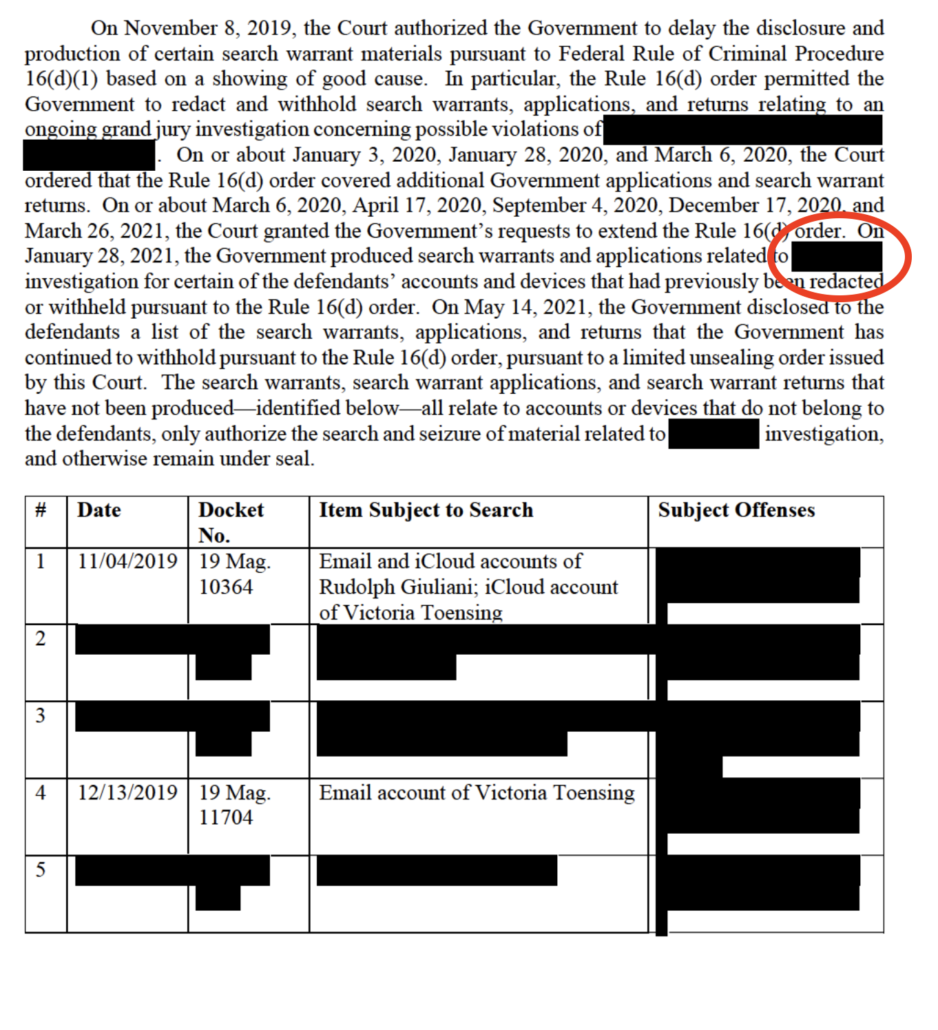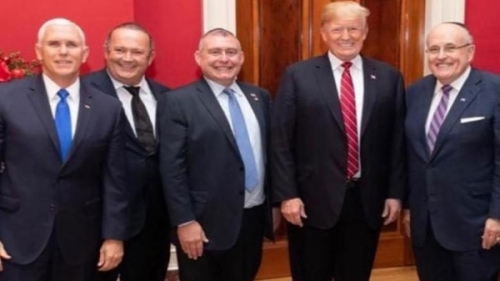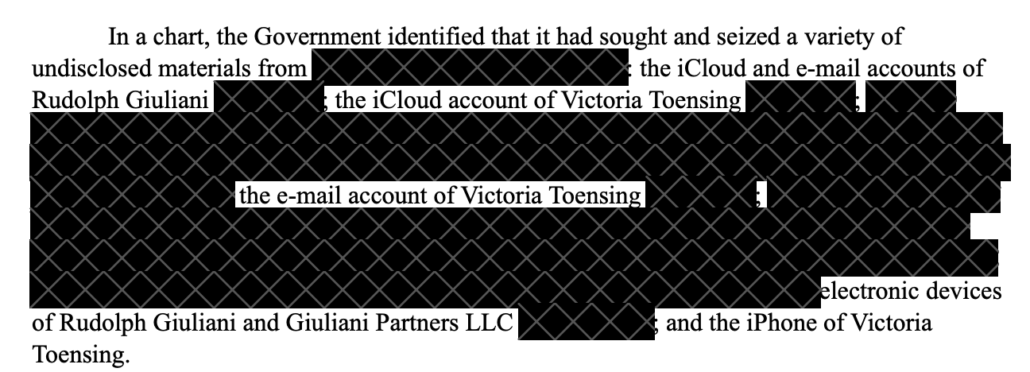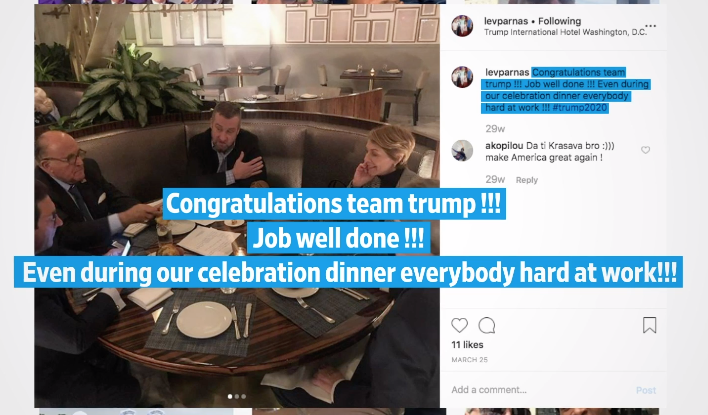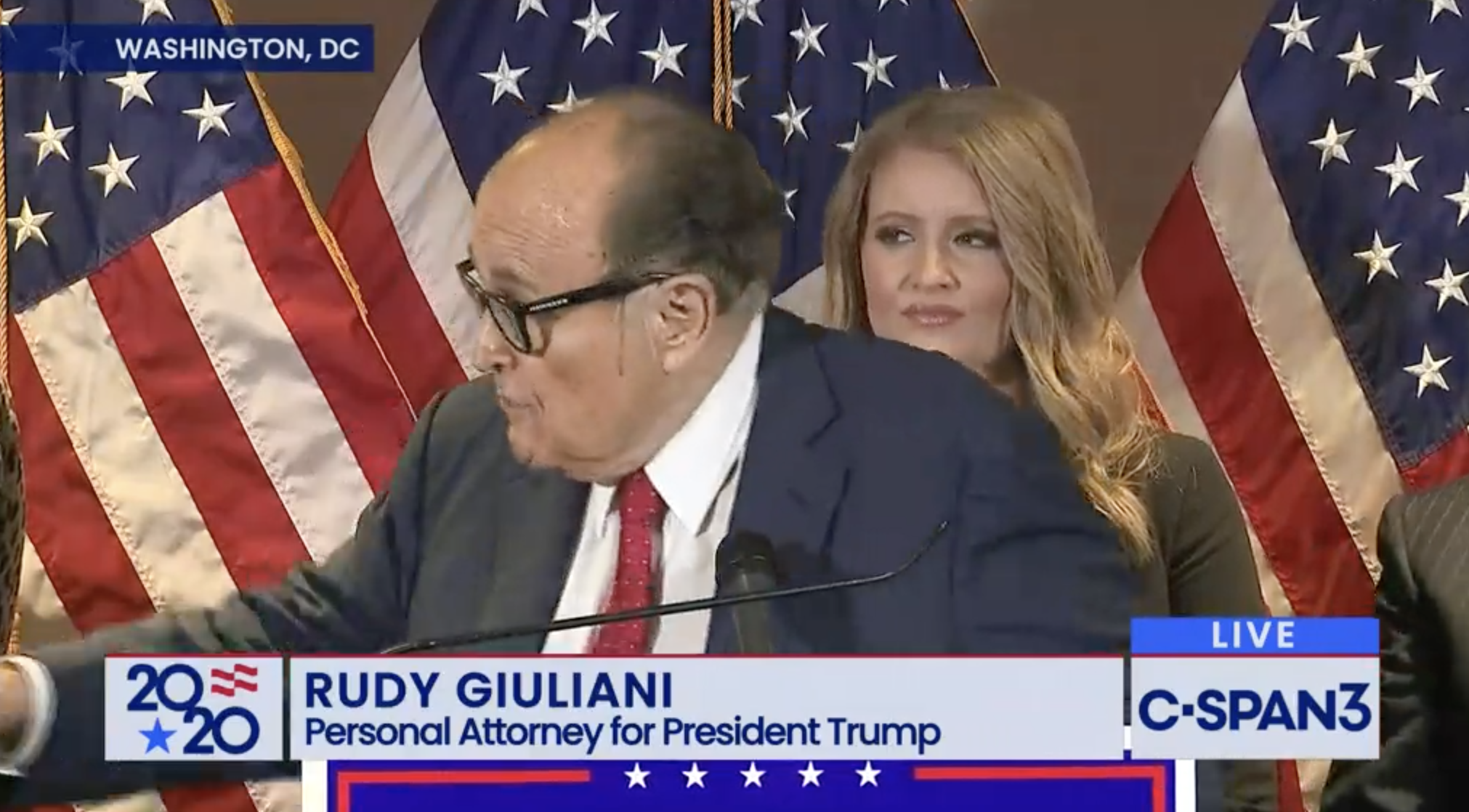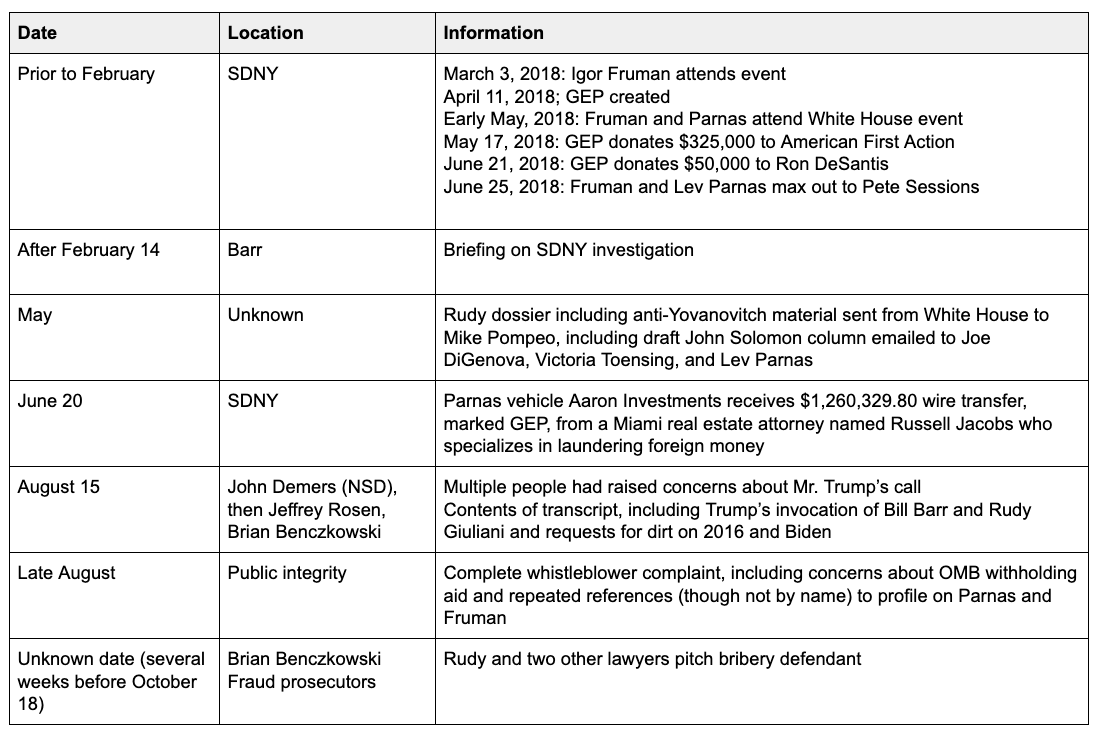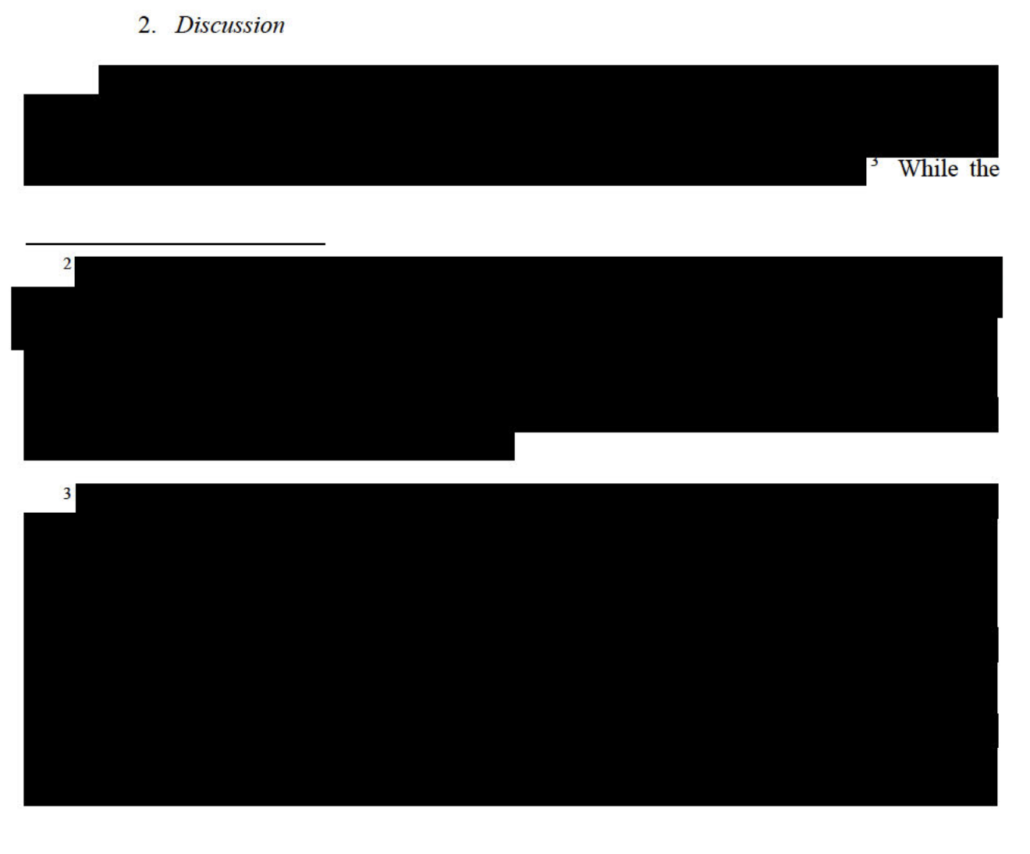The Rudy Giuliani Warrants Likely Go Up To the Andrii Derkach Meeting
For a variety of reasons, I’d like to look at the probable scope of the Rudy Giuliani warrants. I believe the warrant obtained on April 21 probably goes up to, but not far beyond, the meeting Rudy had with Andrii Derkach on December 5, 2019.
This post is based in part on what Rudy Giuliani, Victoria Toensing, and Lev Parnas have telegraphed about these warrants. None of these people are reliable, but Rudy and Toensing, at least, are clearly trying to share information with potential co-conspirators and therefore would want to be accurate. And whether or not the redaction fail in Parnas’ letter was intentional, I believe Parnas was trying to maximize the discomfort that these warrants might pose to powerful people (Parnas knows the targets and dates of the warrants, but it’s not clear whether he knows the date ranges). The post also includes claims from the government response to Parnas’ request for access to the Rudy and Toensing content; the government is reliable but still obviously hiding stuff.
Per Parnas, he knows of three warrants targeting Rudy:
- A November 4, 2019 warrant targeting Rudy’s iCloud and email accounts
- An April 13, 2021 warrant obtaining historical and prospective cell site information from Rudy (and Toensing)
- An April 21, 2021 warrant targeting what ended up being 18 devices from Rudy
Here’s what these letters claim about the warrants:
- The November 4, 2019 warrant “commences when Mayor Giuliani began to represent Donald Trump”
- The start date of the November 4, 2019 warrant was “the commencement of Giuliani’s representation of former President Donald Trump”
- Rudy believes the iCloud warrant obtained “communications with, and on behalf of, the sitting President, containing material relating to the impending impeachment”
- The date range for the April 21, 2021 warrant began “three months later than the iCloud account”
- The end date for the April 21, 2021 warrant went “56 days” later than the iCloud warrant
- The warrant required Apple turn over “subscriber and payment information, device information and settings, transactional records, address book information, call history and voicemails, text message content, email content, photos and videos, documents, search and web histories, third-party application data, location date and iOS device backups” (this is boilerplate, but most people don’t understand how comprehensive a cloud warrant, to Apple or Google, can be)
- The government showed probable cause that the iCloud account included evidence of “22 USC §§612 and 618 [FARA], 18 USC §951 [Foreign Agent], 18 USC §2 [Abetting], and 18 USC §371 [Conspiracy to defraud the US]”
- Two days after the warrants targeting Rudy and Toensing, SDNY obtained a warrant targeting Yuri Lutsenko; later warrants targeted two other Ukrainians, Roman Nasirov and Alexander Levin
- The treatment of information pertaining to someone Toensing represents (possibly, but not definitely, Dmitro Firtash) was more limited in her later warrant
- Parnas believes that some of the information (though he doesn’t specify whether from the November 2019 or the April 2021 search) would include information “that may have been deleted”
- Parnas believes that the warrants obtained “the communications immediately following the defendants’ arrest” on October 10, 2019
- The 2019 returns do not contain any evidence relating to Parnas’ campaign finance charges and no non-duplicative statements from Parnas about Fraud Guarantee
Particularly given the way DOJ removed Parnas and Igor Fruman’s influence peddling for Yuri Lutsenko in their September 17, 2020 superseding indictment, it is virtually certain that this investigation involves, at a minimum, the ultimately successful Lutsenko-backed efforts to get Marie Yovanovitch fired in 2019.
This JustSecurity timeline is enormously helpful for reviewing the entanglements between Parnas and Fruman with Lutsenko (as well as the other events that SDNY is likely interested in). Rudy formally became Trump’s lawyer in April 2018, though there were discussions about him (and Toensing and her spouse Joe DiGenova) joining the team in March 2018, after John Dowd quit. Parnas and Fruman made their first pitch to Trump to fire Yovanovitch on April 30, 2018. In May and June, Parnas and Fruman heavily lobbied Pete Sessions to help get Yovanovitch fired. Then in August 2018, Fraud Guarantee hired Rudy. That puts the likely start dates of Rudy’s warrants sometime between March 20 and April 17, 2018 (for the iCloud warrant), and between mid-June and July or August 2018 (for the device warrant).
Depending on how narrowly the investigation is scoped on Yovanovitch, there are three likely end dates for the iCloud warrant: sometime between April 25 and May 6, 2019, when the effort to fire Yovanovitch succeeded, on October 10, when Parnas and Fruman are arrested, or on November 4, or whatever “present” day Apple complied with the warrant (the gag was issued days later so there may have been a delay in obtaining that approval).
I think one of the later dates is far more likely. That’s because Rudy continued to chase the same effort in Ukraine after Yovanovitch was fired. Plus, the most likely explanation for how SDNY was able to get warrants and a non-disclosure order for the November 2019 warrants against Rudy and Toensing is that they had proof, obtained on October 21, 2019, that Parnas had unsuccessfully attempted to delete information from his own iCloud account. And Rudy, who knows the date ranges of the warrant, claims that it obtained information, “containing material relating to the impending impeachment,” which, if true, would entirely rule out a May 6 end date.
Parnas believes the first warrant extended beyond his October 10 arrest. But it’s not entirely clear whether he knows the date range of the warrants. The government response explained they gave him material from him they had been withholding under a non-disclosure order relating to the investigation in which Rudy is a subject (that is, the Lutsenko campaign) on January 28. But in response to Parnas’ request for materials “immediately following” his arrest, the government got coy about whether they exist in the November 2019 returns (the only ones they have reviewed yet).
For similar reasons, the request for communications by Giuliani and Toensing “immediately following the defendants’ arrests” and “subsequent to” Parnas’s provision of information to the House Intelligence Committee are not subject to disclosure. (Def. Letter at 3.) Not only do these communications have nothing to do with the Government’s case-in-chief, but even if Parnas was entitled to discovery relating to his selective prosecution claim—and he plainly is not—these communications would not even be relevant to such a defense because, to the extent they exist, they post-date the defendants’ arrest.
Besides, there’s a more logical reason to expect that the November 2019 warrants ended on the day of Parnas’ arrest, October 10: because that’s consistent with SDNY’s investigation being limited to its original scope and the entirety of the investigation into Andrii Derkach being at EDNY, as NYT reported is the case.
On December 3, 2019, Rudy met in Budapest with Lutsenko. On December 4, he flew to Kyiv to meet with Derkach, the meeting that begins the relationship that EDNY has ownership of.
A 56-day extension on an end date in response to a November 4 warrant would be December 31, a logical end date for a warrant, but one that would encompass the aftermath of the Derkach meeting scoped to EDNY. Whereas a 56-day extension to an October 10 end date would take you to December 5: through the Derkach meeting associated with the Lutsenko one, but not any further.
That would also be inclusive of communications relating to the pending impeachment (which Rudy says would have been included in the iCloud return), but would be more protective of Rudy’s conversations with Trump as impeachment drew nearer.



